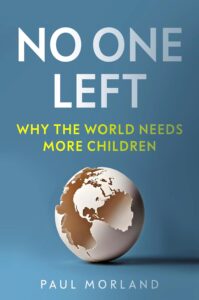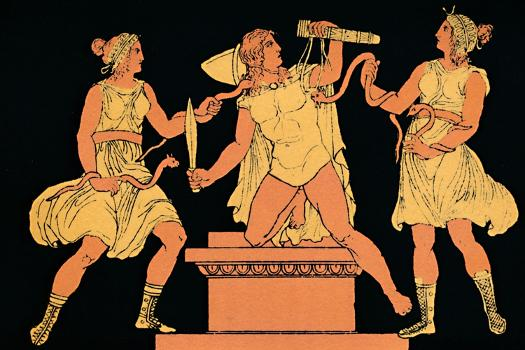In November 2022, philosopher Anna Smajdor published a provocative paper proposing that brain-dead women could be used to gestate other individuals’ babies for them. As Jennifer Lahl pointed out at First Things, this proposal is fraught with ethical implications. It’s a good reminder that just because we can do something does not mean that we should do it.
As a historian, I’m also reminded that no matter how innovative modern thinkers imagine themselves to be, there are generally historical precedents for even the most futuristic-sounding ideas. Smajdor’s proposal is merely the most recent example of scientific misogyny of the sort that we can see in both pre-Christian and post-Christian societies. What is most striking about this proposal is its attack on the mother as a parent to her own child. Such attacks on women’s biological roles were common already in antiquity.
One of the earliest and most poignant examples of such erasure occurs in the myth of Orestes, as retold in 458 BCE by the famed Athenian tragedian Aeschylus. The Oresteia is a trilogy of plays. In its final installment, The Furies, the god Apollo succinctly articulates the view that mothers are not true parents, but mere incubators.
Smajdor’s arguments for WBGD present a modern version of this same argument, as we will see shortly. She—like many proponents of commercial surrogacy—sees the work of gestation as utterly passive, nothing more than a “stranger nourishing a stranger,” as Apollo puts it. Yet the message is mixed: on the one hand, the work of pregnancy is essential for those who would like to acquire a child. On the other hand, this work is not valuable enough to justify the risk and danger of taking it upon oneself. Much better to risk the life of someone who is already deemed “brain dead” and thus nothing more than a husk, a shell maintained by machines, residing somewhere in a scientific limbo between life and death.
Such arguments not only devalue the dignity of the bodies of those proposed for instrumentalization. They are also deeply misogynistic in devaluing the beautiful work that is unique to women: pregnancy.
The Oresteia: Apollo’s Ancient Misogyny
The story begins just after the Trojan War, with the homecoming of Agamemnon, the Greek commander-in-chief. This may sound like a happy occasion, but remember: this is a tragedy. Agamemnon’s homecoming, therefore, does not go well.
The house of Atreus was well-known for being cursed in Greek mythology. Agamemnon’s myriad sins include sacrificing his daughter Iphigenia before the Trojan War, so he could get favorable winds to sail to Troy. When he arrives home with an enslaved concubine, whom he nonchalantly parades in front of his still-grieving wife, Clytemnestra, she is less than pleased. Minutes after his arrival, Clytemnestra kills Agamemnon, with the assistance of her lover.
The murder must be avenged. And so, following orders from the god Apollo himself, Orestes, the exiled son of Agamemnon and Clytemnestra, returns home to kill his mother and avenge the death of his father.
This is where things get really interesting.
In Greek mythology, blood guilt was a serious matter. The most serious blood guilt of all was the pollution incurred by the murder of a close blood relative, such as a parent. When ordered by the gods to avenge the murder of his father by his own mother, therefore, Orestes is placed in a very awkward situation.
Immediately after he kills Clytemnestra, the Furies appear. The duty of these primordial goddesses of revenge was to pursue those who shed kin blood, driving them to insanity and, ultimately, death by suicide. Pursued by the Furies, Orestes flees to seek help from Apollo’s oracle at Delphi—appropriate, since Apollo had placed him in this bind to begin with. There, Apollo works together with the goddess Athena to propose a solution that the Furies accept: they will hold a murder trial of Orestes in Athens, with the Athenian citizens as jury.
This is an unusual murder trial, as there is no dispute over the fact that Orestes has killed Clytemnestra, his mother. The question is, rather, whether the Furies, who act as prosecutors, need to punish him for this murder.
Speaking in Orestes’ defense, Apollo proposes a striking argument: a mother is not a real parent of a child. Apollo articulates his theory of scientific misogyny, saying:
Then learn the truth, the one named mother
is not the child’s true parent but the nurturer
of the newly sown seed. Man mounts to create life,
whereas woman is a stranger fostering a stranger,
nourishing the young, unless a god blights the birth.
I have proof that there can be a father without a mother,
proof that what I say is true,
there stands your witness: (indicating Athena) The child of Zeus.
She never grew in the darkness of a womb,
and no goddess could have borne such a child. (The Furies, vv. 657-666).
Let us unpack Apollo’s argument, which wins Orestes’ acquittal at the trial, convincing the jury of (male) Athenian citizens. Apollo argues that Orestes is not guilty of the murder of kin, because a mother is not really a blood relative of a child. Only the father is true blood kin. Therefore, in avenging his father’s death, Orestes’s murder of Clytemnestra was fully justified: he killed a mere stranger to avenge someone who was his true parent. Apollo describes the mother as nothing more than a passive incubator. Only the father “creates life.” In fact, the woman who carries the child for nine months is not even described as “mother” by Apollo, who reduces her to a generic “woman.” She is nothing more than “a stranger fostering a stranger.”
As proof for his argument, Apollo appeals to the story of the goddess Athena, considered the most powerful of goddesses in the Greek pantheon, and the only one who was born motherless, springing forth from Zeus’ own head. By contrast, when Zeus’ wife Hera tried to have a child all by herself, without a father, the result was the lame, ugly god Hephaestus, the laughingstock of the rest of the Olympian gods.
Of course, one could argue that Apollo’s argument is not to be taken literally—that Aeschylus did not intend to reflect real beliefs in the Greek world. Indeed, some have interpreted Apollo’s argument as an example of extreme sophistry, uttered largely in jest. The problem is, there is a plentiful tradition of similarly misogynistic writings about the nature of women, harkening back to such early Greek poets as Hesiod and Semonides, and continuing on after Aeschylus in the work of writers such as Aristophanes and Plato.
Seeing women as lazy and passive was quite common in early Greece, and not just in regard to pregnancy and childbearing. In fact, it is striking to see pregnancy left out entirely from the discussions of family labor in the poetry of both Hesiod and Semonides. Women, both Hesiod and Semonides tell us, were created as the punishment the gods devised for men. In Semonides’ poem about the ten types of wives, corresponding to ten different animals, we meet, among others, the sow (she is filthy and lazy), the horse (pretty, but she avoids all work), and the donkey (she’ll work, but only if you beat her, and then she will eat you out of house and home). What’s more, Semonides and Aristophanes both present women as dangerously promiscuous. Indeed, in early Greek imagination it was women who were unable to regulate their sex drive, rather than men. All of these thinkers also describe women as inferior to men both in body and mind—points reinforced also by Greek myths.
This cultural baggage is doubtless at play in the arguments that Aeschylus’ Apollo presents in defense of Orestes. And it should remind us that the devaluing of women’s work in pregnancy and motherhood rarely appears as an isolated belief in a culture. Rather, it is packaged along with other views that a society holds about the nature and value of women more generally.
The Work and the Journey of Pregnancy
In our present day, a similar condescension towards women and their work is common. It’s present, for example, in many manuals for expecting mothers over the past century, as historian Agnes Howard has argued in her book Showing: What Pregnancy Tells Us About Being Human.
When approached as an active, rather than passive task, Howard notes, pregnancy is about much more than the baby. There are, after all, two people intricately connected as one. And so, pregnancy involves the mother growing in the virtues—prudence, charity and generosity, hospitality, and courage—all while she is nurturing the child within in a physical sense. But this perspective only makes sense in the context of fully valuing pregnant women as people rather than convenient containers. Containers do not need to grow in the virtues, after all, nor can they develop a relationship with their growing contents during their nine-month stay. That relationship only matters if the full humanity of both child and mother is acknowledged and respected as something both biological and—dare we say it?—sacred.
Like the pre-Christian Mediterranean world, the post-Christian world has no framework for valuing either the relational aspect of pregnancy or the personhood of the mother or the child, to say nothing of the father. All a mother and father contribute is the basic matter that can be scientifically combined in the lab, carefully tested, and expertly transplanted into a human container, to be harvested nine months later.
In truth, pregnancy is much more than a utilitarian biological process for generating new life. When it comes to pregnancy and childbirth, the journey matters. I hold precious the memories of each of my children in utero—memories of feeling each baby move for the first time, of singing to them, and of my husband reading books to them. Science suggests that babies in utero hear sounds within the mother’s body around eighteen weeks of gestation. They begin hearing sounds of voices around twenty-seven weeks, with the amniotic fluid serving as a sound amplifier. By the time a child is born, he or she has been experiencing a familial environment for months, in ways we are just beginning to understand.
Yes, pregnancy is hard work. Every woman who has given birth to a child has the scars and the stretch marks to prove it. But there is incredible, unspeakable beauty and tenderness in these months of expecting a baby. And there is further beauty in feeling this sense of the ultimate team project undertaken with one’s spouse.
When presented with proposals like Smajdor’s, we must remember that people are more than just bodies. We need to remember the significance of relationships in every stage of life. Science struggles to measure or quantify such bonds—between husbands and wives, mothers and their children, and people of all ages—which makes it easy to ignore or devalue them. Yet these relationships constitute a core part of not just what it means to be a man or woman, but what it means to be human. That’s why today, as ever before, we must defend the active power and sacred beauty of motherhood.



